Fleurs du Mal Magazine



Voltaire
(1694-1778)
A Mme Lullin
Hé quoi ! vous êtes étonnée
Qu’au bout de quatre-vingts hivers,
Ma Muse faible et surannée
Puisse encor fredonner des vers ?
Quelquefois un peu de verdure
Rit sous les glaçons de nos champs ;
Elle console la nature,
Mais elle sèche en peu de temps.
Un oiseau peut se faire entendre
Après la saison des beaux jours ;
Mais sa voix n’a plus rien de tendre,
Il ne chante plus ses amours.
Ainsi je touche encor ma lyre
Qui n’obéit plus à mes doigts ;
Ainsi j’essaie encor ma voix
Au moment même qu’elle expire.
“Je veux dans mes derniers adieux,
Disait Tibulle à son amante,
Attacher mes yeux sur tes yeux,
Te presser de ma main mourante.”
Mais quand on sent qu’on va passer,
Quand l’âme fuit avec la vie,
A-t-on des yeux pour voir Délie,
Et des mains pour la caresser ?
Dans ce moment chacun oublie
Tout ce qu’il a fait en santé.
Quel mortel s’est jamais flatté
D’un rendez-vous à l’agonie ?
Délie elle-même, à son tour,
S’en va dans la nuit éternelle,
En oubliant qu’elle fut belle,
Et qu’elle a vécu pour l’amour.
Nous naissons, nous vivons, bergère,
Nous mourons sans savoir comment ;
Chacun est parti du néant :
Où va-t-il ?… Dieu le sait, ma chère.
Voltaire poetry
fleursdumal.nl magazine
More in: Archive U-V, Voltaire
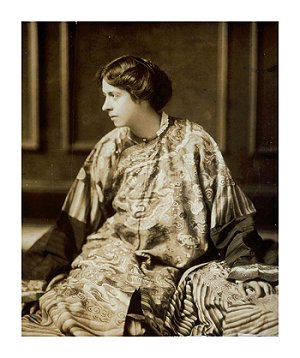
Eunice Tietjens
(1884 – 1944)
The Beggar
“Christ! What is that–that–Thing?
Only a beggar, professionally maimed, I think.”
Across the narrow street it lies, the street where little
children are.
It is rocking its body back and forth, back and forth,
ingratiatingly, in the noisome filth.
Beside the body are stretched two naked stumps of
flesh, on one the remnant of a foot. The wounds
are not new wounds, but they are open and they
fester. There are flies on them.
The Thing is whining, shrilly, hideously.
“Professionally maimed, I think.”
Christ!
(Hwai Yuen)
Eunice Tietjens poetry
fleursdumal.nl magazine
More in: Archive S-T, Tietjens, Eunice
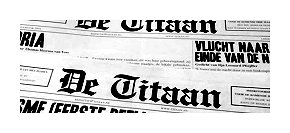
Titaan #3: de blote kont der kunst
De Titaan – Literair blad uit het Zuiden – presenteert haar derde editie in Amsterdam!
Met bijdragen van Emma Curvers, Joubert Pignon, Arthur van Amerongen, Nathan de Groot, Tom van Nuenen, Martijn Neggers, Jeroen de Leijer, Marijn Sikken, Willem Claassen, Arie Storm, Helena Hoogenkamp, Robert Proost, Johan Roos, Bas Jongenelen, Daniël van der Meer, Henk Spaan, Jan van Mersbergen, Max Moragie, Ruben van Luijk, Chretiën Breukers, Peter Knipmeijer, Bloedend Paard, Lukas Meijsen en Charlotte Mutsaers.
Dit derde nummer, getiteld ‘De blote kont der kunst’, wordt de wereld ingegooid met een ónwaarschijnlijk spectaculair programma:
Marijn Sikken
Daniël van der Meer (Das Magazin)
De Keizer van de Literaire Bingo
Muziek van Case Mayfield
De redactie van De titaan: Dat Nederland groepshoofd werd op het WK had niemand verwacht, en dat die achtste finale dan meteen na de presentatie van Titaan #3 begint wisten we ook niet. Maar geen nood! Ook ‘t Molentje heeft een mooie televisie. Dus wij stellen voor: kom eerst literatuur luisteren en daarna voetbal kijken bij café ‘t Molentje.
Hoera! Hup Nederland! Hup Literatuur!
ZONDAG 29 JUNI 2014 – ‘T MOLENTJE (SINGEL 278) AMSTERDAM – 15:30 UUR
# Meer info op website De Titaan – Literair blad uit het Zuiden
fleursdumal.nl magazine
More in: Art & Literature News, LITERARY MAGAZINES
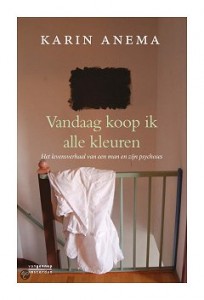
Nicole Montagne
& Karin Anema
op zondag 29 juni 2014
in VPRO Boeken
11.20 uur Nederland 1
Nicole Montagne – Makelaar in Pruisen
Nicole Montagne, grafica en schrijfster, observeert de wereld in ‘Een makelaar in Pruisen’ met een prikkelende opmerkzaamheid.
Karin Anema – Vandaag koop ik alle kleuren
Ook te gast is reisboekenschrijfster Karin Anema, die dit keer een reis maakte naar het innerlijk van een man met een psychiatrisch verleden en de diagnose schizofrenie.
fleursdumal.nl magazine
More in: - Book News, Art & Literature News
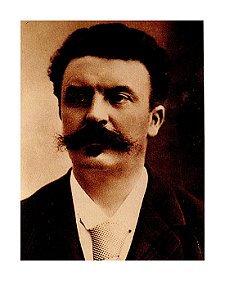
Guy de Maupassant
(1850-1893)
DERNIÈRE SOIRÉE PASSÉE AVEC MA MAÎTRESSE
Il fallait la quitter, et pour ne plus me voir
Elle partait, mon Dieu, c’était le dernier soir.
Elle me laissait seul ; cette femme cruelle
Emportait mon amour et ma vie avec elle.
Moi je voulus encore errer comme autrefois
Dans les champs et l’aimer une dernière fois.
La nuit nous apportait et l’ombre et le silence,
Et pourtant j’entendais comme une voix immense,
Tout semblait animé par un souffle divin.
La nature tremblait, j’écoutais et soudain
Un étrange frisson troubla toute mon âme.
Haletant, un moment j’oubliai cette femme
Que j’aimais plus que moi. Le vent nous apportait
Mille sons doux et clairs que l’écho répétait.
Ce n’était plus de l’air le calme et frais murmure,
Mais c’était comme un souffle étreignant la nature,
Un souffle, un souffle immense, errant, animant tout,
Qui planait et passait, me rendant presque fou,
Un son mystérieux et qui, sur son passage,
Réveillait et frappait les échos du bocage.
Tout vivait, tout tremblait, tout parlait dans les bois,
Comme si, pour fêter le plus puissant des rois,
Et l’insecte et l’oiseau et l’arbre et le feuillage
Parlaient, quand tout dormait, un sublime langage.
Je restai frémissant : ce bruit mystérieux,
C’était Dieu descendu des cieux.
C’était ce Dieu puissant si grand et solitaire
Qui venait oublier sa grandeur sur la terre.
Dieu las et fatigué de sa divinité,
Las d’honneur, de puissance et d’immortalité,
Des éternels ennuis où sa grandeur l’enchaîne,
Qui venait partager notre nature humaine.
Il avait choisi l’heure où tout dort et se tait,
Où l’homme, indifférent à tout ce que Dieu fait,
Attaché seulement à ses soins mercenaires,
Prend un peu de repos qu’il dérobe aux affaires.
Car c’était aussi l’heure où ce Dieu généreux
Peut bénir et donner la main aux malheureux,
L’heure où celui qui souffre et gémit en silence,
Qui craint pour son malheur la froide indifférence,
Délivré du fardeau de l’égoïsme humain,
Sans craindre la pitié peut planer libre enfin.
Dieu vient le consoler, il soutient sa misère,
Il rend ses pleurs plus doux, sa douleur moins amère,
Il verse sur sa plaie un baume bienfaisant.
D’autres craignent encore un oeil indifférent,
Et les regards de l’homme et les bruits de la terre.
Ils cherchent aussi l’heure où tout est solitaire,
Dieu les voit, il bénit le bonheur des amants.
Invisible témoin, il entend leurs serments.
Il aime cet amour qu’il ne goûtera pas
Et dans les bois, la nuit, il protège leurs pas.
Il était là, son souffle errait sur la nature,
Paraissait éveiller comme un vaste murmure,
Tout ce qu’il a formé s’animait et, tremblant,
S’agitait au contact de ce Dieu tout-puissant,
Et tout parlait de lui, le vent sous le feuillage,
Et l’arbuste, et le flot caressait le rivage,
Et tous ces bruits divers ne formaient qu’une voix :
C’était Dieu qui parlait au milieu des grands bois.
Tous deux nous l’écoutions et nous versions des larmes ;
Quand on va se quitter, l’amour a tant de charmes !
Et nos pleurs, qui tombaient comme des diamants,
Goutte à goutte brillaient sur les herbes des champs.
Mais de cette belle soirée
Et de ma maîtresse adorée
Que restait-il le lendemain ?
Seul le pâtre de grand matin,
En conduisant au pâturage
Son gras troupeau, vit sur l’herbage
Les quelques gouttes de nos pleurs,
Seule marque de nos douleurs ;
Mais il les prit pour la rosée.
“L’herbe n’est point encor séchée”,
Se dit-il en pressant le pas.
Hélas ! il ne soupçonna pas
Que de chagrins et de misères
Cachait cette eau sur les bruyères.
Et ses brebis qui le suivaient
Broutaient les herbes et buvaient
Nos pleurs sans arrêter leur course,
Mais rien n’en a trahi la source.
1868
Dernière soirée passée avec ma maîtresse a paru dans la Revue des Revues du 1er juin 1900.
Guy de Maupassant poetry
fleursdumal.nl magazine
More in: Archive M-N, Guy de Maupassant, Maupassant, Guy de

The Sorrows of Young Werther (43) by J.W. von Goethe
SEPTEMBER 4.
It is even so! As nature puts on her autumn tints it becomes autumn with
me and around me. My leaves are sere and yellow, and the neighbouring
trees are divested of their foliage. Do you remember my writing to you
about a peasant boy shortly after my arrival here? I have just made
inquiries about him in Walheim. They say he has been dismissed from his
service, and is now avoided by every one. I met him yesterday on the
road, going to a neighbouring village. I spoke to him, and he told me
his story. It interested me exceedingly, as you will easily understand
when I repeat it to you. But why should I trouble you? Why should I
not reserve all my sorrow for myself? Why should I continue to give you
occasion to pity and blame me? But no matter: this also is part of my
destiny.
At first the peasant lad answered my inquiries with a sort of subdued
melancholy, which seemed to me the mark of a timid disposition; but, as
we grew to understand each other, he spoke with less reserve, and openly
confessed his faults, and lamented his misfortune. I wish, my dear
friend, I could give proper expression to his language. He told me
with a sort of pleasurable recollection, that, after my departure, his
passion for his mistress increased daily, until at last he neither knew
what he did nor what he said, nor what was to become of him. He could
neither eat nor drink nor sleep: he felt a sense of suffocation; he
disobeyed all orders, and forgot all commands involuntarily; he seemed
as if pursued by an evil spirit, till one day, knowing that his mistress
had gone to an upper chamber, he had followed, or, rather, been drawn
after her. As she proved deaf to his entreaties, he had recourse to
violence. He knows not what happened; but he called God to witness that
his intentions to her were honourable, and that he desired nothing more
sincerely than that they should marry, and pass their lives together.
When he had come to this point, he began to hesitate, as if there
was something which he had not courage to utter, till at length he
acknowledged with some confusion certain little confidences she had
encouraged, and liberties she had allowed. He broke off two or three
times in his narration, and assured me most earnestly that he had
no wish to make her bad, as he termed it, for he loved her still as
sincerely as ever; that the tale had never before escaped his lips,
and was only now told to convince me that he was not utterly lost and
abandoned. And here, my dear friend, I must commence the old song which
you know I utter eternally. If I could only represent the man as he
stood, and stands now before me, could I only give his true expressions,
you would feel compelled to sympathise in his fate. But enough: you,
who know my misfortune and my disposition, can easily comprehend
the attraction which draws me toward every unfortunate being, but
particularly toward him whose story I have recounted.
On perusing this letter a second time, I find I have omitted the
conclusion of my tale; but it is easily supplied. She became reserved
toward him, at the instigation of her brother who had long hated him,
and desired his expulsion from the house, fearing that his sister's
second marriage might deprive his children of the handsome fortune they
expected from her; as she is childless. He was dismissed at length; and
the whole affair occasioned so much scandal, that the mistress dared not
take him back, even if she had wished it. She has since hired another
servant, with whom, they say, her brother is equally displeased, and
whom she is likely to marry; but my informant assures me that he himself
is determined not to survive such a catastrophe.
This story is neither exaggerated nor embellished: indeed, I have
weakened and impaired it in the narration, by the necessity of using the
more refined expressions of society.
This love, then, this constancy, this passion, is no poetical fiction.
It is actual, and dwells in its greatest purity amongst that class of
mankind whom we term rude, uneducated. We are the educated, not the
perverted. But read this story with attention, I implore you. I am
tranquil to-day, for I have been employed upon this narration: you see
by my writing that I am not so agitated as usual. I read and re-read
this tale, Wilhelm: it is the history of your friend! My fortune has
been and will be similar; and I am neither half so brave nor half so
determined as the poor wretch with whom I hesitate to compare myself.
The Sorrows of Young Werther (Die Leiden des jungen Werther) by J.W. von Goethe. Translated by R.D. Boylan.
To be continued
fleursdumal.nl magazine
More in: -Die Leiden des jungen Werther, Goethe, Johann Wolfgang von

Alfred Lichtenstein
(1889-1914)
Der Athlet
Einer ging in zerrissenen Hausschuhen
Hin und her durch das kleine Zimmer,
Das er bewohnte.
Er sann über die Geschehnisse,
Von denen in dem Abendblatt berichtet war.
Und gähnte traurig, wie nur jemand gähnt,
Der viel und Seltsames gelesen hat –
Und der Gedanke überkam ihn plötzlich,
Wie wohl den Furchtsamen die Gänsehaut
Und wie das Aufstoßen den Übersättigten,
Wie Mutterwehen:
Das große Gähnen sei vielleicht ein Zeichen,
Ein Wink des Schicksals, sich zur Ruh zu legen.
Und der Gedanke ließ ihn nicht mehr los.
Und also fing er an, sich zu entkleiden …
Als er ganz nackt war, hantelte er etwas.
Alfred Lichtenstein poetry
fleursdumal.nl magazine
More in: *War Poetry Archive, Archive K-L, Expressionism, Lichtenstein, Alfred

Op zondag 3 augustus 2014 vindt in de boeken- en Hanzestad Deventer de 26e editie plaats van de Deventer Boekenmarkt.
In totaal zijn 878 kramen gevuld met vele duizenden boeken: ruim 6 kilometer markt met deelname van gerenommeerde boekhandelaren en antiquariaten uit heel Nederland. De markt begint om 9.30 uur, maar al om 7.00 uur zijn er de eerste bezoekers.
Deventer Boekenmarkt – de grootste van Europa – Zondag 3 augustus 2014
Voorafgaand en tijdens de Deventer Boekenmarkt worden er tal van activiteiten in Deventer georganiseerd rondom het thema boeken.
De avond voorafgaand aan de Boekenmarkt, op zaterdag 2 augustus, vindt poëziefestival Het Tuinfeest plaats.
Deelnemende dichters zijn: Erik Bindervoet, Pim te Bokkel, Pieter Boskma, Heleen Bosma, Annelie David, Hanneke van Eijken, Hélène Gelèns, Piet Gerbrandy, Annemieke Gerrist, Erik Jan Harmens, Marjolijn van Heemstra, Judith Herzberg, Tjitske Jansen, Antoine de Kom, Anton Korteweg, Astrid Lampe, Lieke Marsman, Els Moors, Martijn den Ouden, Froukje van der Ploeg, Esther Porcelijn, K. Schippers, Joost Zwagerman en Wim Brands.
Op zaterdag 2 en zondag 3 augustus, van 12.00-15.00 uur en 17.00-20.00 uur, vindt voor het eerst in de Bergkerk Margriet Spektakel-op-Tafel plaats.
# meer informatie op website Deventer Boekenmarkt
fleursdumal.nl magazine
More in: - Book Lovers, Art & Literature News, Brands, Wim, Jansen, Tjitske, Porcelijn, Esther, Schippers, K., Zwagerman, Joost
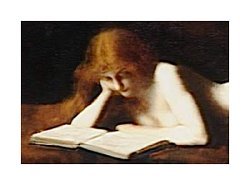
Eduard Mörike
(1822-1875)
Josephine
Das Hochamt war. Der Morgensonne Blick
Glomm wunderbar im süßen Weihrauchscheine;
Der Priester schwieg; nun brauste die Musik
Vom Chor herab zur Tiefe der Gemeine.
So stürzt ein sonnetrunkner Aar
Vom Himmel sich mit herrlichem Gefieder,
So läßt Jehovens Mantel unsichtbar
Sich stürmend aus den Wolken nieder.
Dazwischen hört ich eine Stimme wehen,
Die sanft den Sturm der Chöre unterbrach;
Sie schmiegte sich mit schwesterlichem Flehen
Dem süß verwandten Ton der Flöte nach.
Wer ist’s, der diese Himmelsklänge schickt?
Das Mädchen dort, das so bescheiden blickt.
Ich eile sachte auf die Galerie;
Zwar klopft mein Herz, doch tret ich hinter sie.
Hier konnt ich denn in unschuldsvoller Lust
Mit leiser Hand ihr festlich Kleid berühren,
Ich konnte still, ihr selber unbewußt,
Die nahe Regung ihres Wesens spüren.
Doch, welch ein Blick und welche Miene,
Als ich das Wort nun endlich nahm,
Und nun der Name Josephine
Mir herzlich auf die Lippen kam!
Welch zages Spiel die braunen Augen hatten!
Wie barg sich unterm tiefgesenkten Schatten
Der Wimper gern die ros’ge Scham!
Und wie der Mund, der eben im Gesang
Die Gottheit noch auf seiner Schwelle hegte,
Sich von der Töne heilgem Überschwang
Zu mir mit schlichter Rede herbewegte!
O dieser Ton – ich fühlt es nur zu bald,
Schlich sich ins Herz und macht es tief erkranken;
Ich stehe wie ein Träumer in Gedanken,
Indes die Orgel nun verhallt,
Die Sängerin vorüberwallt,
Die Kirche aufbricht und die Kerzen wanken.
Eduard Mörike poetry
fleursdumal.nl magazine
More in: Archive M-N, CLASSIC POETRY
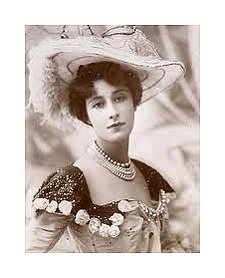
Renée Vivien
(1877-1909)
À une Femme
Tendre à qui te lapide et mortelle à qui t’aime,
Faisant de l’attitude un frisson de poème,
O Femme dont la grâce enfantine et suprême
Triomphe dans la fange et les pleurs et le sang,
Tu n’aimes que la main qui meurtrit ta faiblesse,
La parole qui trompe et le baiser qui blesse,
L’antique préjugé qui meurt avec noblesse
Et le désir d’un jour qui sourit en passant.
Férocité passive, âme légère et douce,
Pour t’attirer, il faut que le geste repousse :
Ta chair inerte appelle, en râlant, la secousse
Et l’effort sans beauté du mâle triomphant.
Esclave du hasard, des choses et de l’heure,
Être ondoyant, en qui rien de vrai ne demeure,
Tu n’accueilles jamais la passion qui pleure
Ni l’amour qui languit sous ton regard d’enfant.
Le baume du banal et le fard du factice,
L’absurdité des lois, la vanité du vice
Et l’amant dont l’orgueil contente ton caprice,
Suffisent à ton cœur sans rêve et sans espoir.
Jamais tu ne t’éprends de la grâce d’un songe,
D’un reflet dont le charme expirant se prolonge,
D’un écho dans lequel le souvenir se plonge,
Jamais tu ne pâlis à l’approche du soir.
Cendres et Poussières, 1902
Renée Vivien poetry
fleursdumal.nl magazine
More in: Archive U-V, Renée Vivien, Vivien, Renée
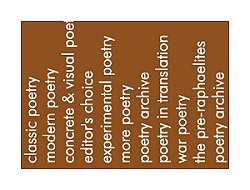
Verdwijnpunt
The past is a different country:
They do things differently there.
(L.P. Hartley)
Zij die deze kasseien en sporen legden
gaven hun lijven al lang geleden terug.
Maar eerder, eerder zegden zij dat ze
geloofden. Zegden zij dat ze wel wisten
hoe alles zat. Hun onherinnerde dromen
wemelden van de oorlog die nog moest
komen, duister als de kleur die de rivier
’s avonds heeft. Er zweemt een heimwee
over deze stenen, maar het is niet klaar
waarnaar. Moet er eigenlijk niet een dun
lijntje om alles heen? Met richtingwijzers?
Toekomst heeft de kraag ruig omhoog.
Bert Bevers
verschenen in de bloemlezing Schaduw, samenstelling Frank De Vos, Hoboken, 2014
fleursdumal.nl magazine
More in: Archive A-B, Bevers, Bert

The Sorrows of Young Werther (42) by J.W. von Goethe
AUGUST 4.
I am not alone unfortunate. All men are disappointed in their hopes, and
deceived in their expectations. I have paid a visit to my good old woman
under the lime-trees. The eldest boy ran out to meet me: his exclamation
of joy brought out his mother, but she had a very melancholy look. Her
first word was, "Alas! dear sir, my little John is dead." He was the
youngest of her children. I was silent. "And my husband has returned
from Switzerland without any money; and, if some kind people had not
assisted him, he must have begged his way home. He was taken ill with
fever on his journey." I could answer nothing, but made the little one
a present. She invited me to take some fruit: I complied, and left the
place with a sorrowful heart.
AUGUST 21.
My sensations are constantly changing. Sometimes a happy prospect opens
before me; but alas! it is only for a moment; and then, when I am
lost in reverie, I cannot help saying to myself, "If Albert were
to die?--Yes, she would become--and I should be"--and so I pursue a
chimera, till it leads me to the edge of a precipice at which I shudder.
When I pass through the same gate, and walk along the same road which
first conducted me to Charlotte, my heart sinks within me at the change
that has since taken place. All, all, is altered! No sentiment, no
pulsation of my heart, is the same. My sensations are such as would
occur to some departed prince whose spirit should return to visit the
superb palace which he had built in happy times, adorned with costly
magnificence, and left to a beloved son, but whose glory he should find
departed, and its halls deserted and in ruins.
SEPTEMBER 3.
I sometimes cannot understand how she can love another, how she dares
love another, when I love nothing in this world so completely, so
devotedly, as I love her, when I know only her, and have no other
possession.
The Sorrows of Young Werther (Die Leiden des jungen Werther) by J.W. von Goethe. Translated by R.D. Boylan.
To be continued
fleursdumal.nl magazine
More in: -Die Leiden des jungen Werther, Goethe, Johann Wolfgang von
Thank you for reading Fleurs du Mal - magazine for art & literature